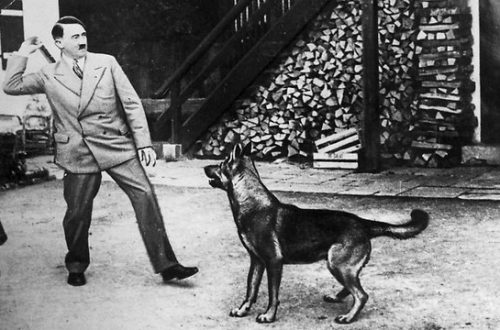This is a guest post by Paul Bogdanor
Attempting to defend his recent outbursts, Ken Livingstone has invoked Lenni Brenner’s book Zionism in the Age of the Dictators. Livingstone explains:
The shocking thing about his book was that he revealed that not only Hitler had wanted to move all of Germany’s Jews to Israel, but that the Zionist leadership continued a dialogue privately with Hitler from ’33 when he became Chancellor from [sic] 1940-41…
Lenni’s book shows a shared common belief between the Nazis and the Zionists in preserving their race from interracial marriage and things like that.
They wanted to preserve their ethnic purity and that’s why they had a working relationship.
Here is a typical statement from Brenner’s book about the “collaboration” between Zionists and Nazis in Germany:
Believing that the ideological similarities between the two movements – their contempt for liberalism, their common volkish racism and, of course, their mutual conviction that Germany could never be the homeland of its Jews – could induce the Nazis to support them, the ZVfD [Zionist Federation of Germany] solicited the patronage of Adolf Hitler, not once but repeatedly, after 1933. [1]
Brenner described the German Zionists as “mimics of the Nazis” and “confirmed racists.” [2]
One of the documents he used to “prove” as much was an article by Rabbi Joachim Prinz, a German Zionist, published in 1937 after his escape from the Third Reich.
Brenner quoted these lines from Prinz [3]:
Everyone in Germany knew that only the Zionists could responsibly represent the Jews in dealings with the Nazi government. We all felt sure that one day the government would arrange a round table conference with the Jews, at which – after the riots and atrocities of the revolution had passed – the new status of German Jewry could be considered. The government announced very solemnly that there was no country in the world which tried to solve the Jewish problem as seriously as did Germany. Solution of the Jewish question? It was our Zionist dream! We never denied the existence of the Jewish question! Dissimilation? It was our own appeal! … In a statement notable for its pride and dignity, we called for a conference [here Brenner placed a full stop, omitting the following words:] to consider the question of the Jewish status. [4]
Read in isolation, the passage can be used by Brenner to suggest a belief on the part of Prinz that Zionists and Nazis were ideological soulmates and should therefore collaborate.
But Brenner failed to mention what Prinz wrote next:
In those days, we believed in the slim possibility of saving the German Jews, but nothing happened. Nothing! We were not even given an answer. [5]
Prinz added:
When we realised that the German Government never intended to solve the Jewish problem, and that its only attitude toward Jews was one of humiliation, degradation, and the spirit of the Sturmer, we turned our thoughts in the direction of saving whatever possible from the enormous bankruptcy of a once wealthy Jewry. That meant constructive tasks. [6]
Brenner omitted all of this. But later in his book he did not neglect to quote an apparently damning confession by Prinz:
It was very difficult for the Zionists to operate. It was morally disturbing to seem to be considered as the favoured children of the Nazi Government, particularly when it dissolved the anti-Zionist youth groups, and seemed in other ways to prefer the Zionists. The Nazis asked for a “more Zionist behaviour.” [7]
Again, read in isolation, the passage seems to support Brenner’s claims. In Brenner’s account, these lines show that “the Nazis preferred the Zionists to all other Jews.” [8]
But immediately after the words in question, Prinz went on to say:
All this was most disagreeable and painful to the Zionists. But the Nazi attitude toward the Zionists was only a facade. In reality, the Zionists were and are miserably treated.
Prinz continued:
During the years, Zionists have frequently been arrested. Zionist meetings were forbidden or dissolved… Zionist officials were and still are frequently called to the Gestapo and examined in not very polite terms. In brief, the seeming pro-Zionist attitude of the German Government is not an expression of, and should not be confused with, cooperation on the part of one side or the other. [9]
None of this was mentioned in Brenner’s Zionism in the Age of the Dictators. As Gill Seidel pointed out in her important study of antisemitism and Holocaust denial:
Brenner does not quote this part of Prinz’s article which makes a case against any charge of “collaboration.” Brenner refers to the same source, but by selective quotation interprets it in such a way as to convey the opposite meaning. [10]
Such are the methods of the author who is presented by Ken Livingstone as the fountainhead of knowledge on the Nazi treatment of Zionists.
Years later, Brenner was even foolhardy enough to put together another book, 51 Documents: Zionist Collaboration With the Nazis, in which the article whose meaning he falsified in Zionism in the Age of the Dictators is reproduced in full, so that interested readers can easily confirm his dishonesty for themselves.
Does Lenni Brenner’s modus operandi differ at all from the tactics of countless other malevolent cranks who mutilate the historical record to promote their sinister political ideologies?
Does Ken Livingstone – with his poisonous rhetoric about Hitler, Zionists, and their “shared common belief” in “ethnic purity” – know or care?
Endnotes
[1] Lenni Brenner, Zionism in the Age of the Dictators (Lawrence Hill Books, 1983), p. 45.
[2] Ibid., p. 52.
[3] Ibid., p. 47.
[4] Joachim Prinz, “Zionism Under the Nazi Government,” The New Palestine, September 17, 1937, reprinted in Young Zionist, November 1937.
[5] Ibid.
[6] Ibid.
[7] Ibid.
[8] Brenner, Zionism in the Age of the Dictators, p. 88.
[9] Prinz, “Zionism Under the Nazi Government.”
[10] Gill Seidel, The Holocaust Denial: Antisemitism, Racism and the New Right (Beyond the Pale Publications, 1986), p. 88.
Gene adds: Rabbi Joachim Prinz went on to become a friend of Martin Luther King and to address the historic 1963 March on Washington for Jobs and Freedom.
Paul Bogdanor adds: Here is a video showing German Jewish survivors testifying about Prinz.


